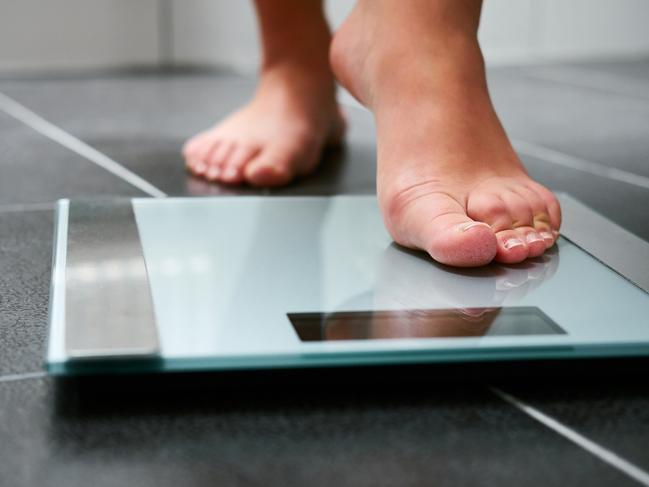Angela Mollard: When weighing up to jab or not to jab, I say eat the cake
When weighing up to jab or not to jab, Angela Mollard says “eat the cake”. But are fat-melting injections the new Botox?

Opinion
Don't miss out on the headlines from Opinion. Followed categories will be added to My News.
There were seven of us – all women in our 40s and 50s – sitting around my dining table celebrating a friend’s birthday. My daughter, 19, also joined us for the cake, an exquisite coconut and lemon curd affair.
As the chat turned from icing techniques to weight gain, suddenly the conversation became more revelatory.
One friend was on some protein shake diet which allowed her to eat what she liked at weekends. Someone’s cousin had tried the weight loss drug Ozempic, losing a staggering 25 kilos.
Another had the injections in her fridge but didn’t feel comfortable trying them. Most of us were wary but given a quick fix to melt away those few pesky kilos …
Would I try it?

I am a size 10. I exercise regularly and mostly eat healthy food.
But over summer I put on five kilos and they are proving damn hard to shift. Would I inject myself once a week for a month rather than cutting back on treats and exercising more?
Before I went into battle with my conscience the pressing question was whether I could get my hands on the meds.
But first, some intel. Semaglutide – sold under the brand name Ozempic – has been used to treat Type 2 diabetes for a few years now. It’s a weekly injection which controls blood-sugar levels but users found it also reduced your appetite by making you feel full.
It’s rumoured that Kim Kardashian used the drug to lose weight to fit into Marilyn Monroe’s dress for last year’s Met Gala while Elon Musk, Chelsea Handler and Jeremy Clarkson have openly credited their weight loss to a weekly jab in the belly.
Last week’s Oscars drew gasps not just for the number of stars wearing white but the slenderness of so many attendees. Are fat melting injections the new Botox? And like the wrinkle-freezing toxin is Ozempic just another quick fix in a society increasingly opting for shortcuts over hard work?

Of course it is – and we have the data to prove it. With the drug exploding in popularity thanks to social media there was a sudden worldwide shortage prompting supplier, Novo Nordisk, to halt supply to Australia. Distribution has now recommenced but in limited quantities and the Therapeutic Goods Administration has warned doctors that those with Type 2 diabetes are the priority and they shouldn’t prescribe it for those seeking it for weight loss. However, another form of semaglutide, sold as Wegovy, has been approved specifically for weight loss and while it is not yet available for use here it’s about to go on sale in Boots chemists in the UK where “customers” (note, not “patients”) will have access after completing an online consultation.
YOURS FOR $310
While the TGA has warned that there are scammers here attempting to sell semaglutide, a quick call to a journalist friend in the UK had me straight onto an online website which could supply the drug after a quick consultation. I had to tweak my weight, adding 20 kilos to produce a BMI over 30, and tick a box saying I would use it in conjunction with diet and exercise but with remarkable ease and a payment of $310 I could get a month’s supply.
With 67 per cent – or two in three Australians – overweight or obese surely this is a godsend. Now we have to fork out for those costly submarines arguably our health system needs this intervention because nutritional advice clearly isn’t working. In my lifetime, I’ve observed everything from the bread diet to the Atkins to Keto and still the nation gets bigger. Yet this recourse to medication instinctively feels wrong.
With OxyContin, the “miracle” pain killer which proved to be addictive, top of mind, semaglutide’s side effects seem woefully under publicised. Nausea, diarrhoea, constipation, anxiety, headaches, vomiting and depression are just a few and there is concern the drug increases the risk of pancreatitis and thyroid and pancreatic cancer. Notably, while users can lose 10-15 per cent of their body weight most gain it back within a year of stopping medication.
It’s science over good sense. Just because we can doesn’t mean we should – even if Novo Nordisk has seen their shares triple in value in less than five years. From where I sit – and sitting is part of the problem – we are not only failing to use the other levers available but stymieing self-determination. Let’s throw a tax and images of clogged arteries on sugary drinks and processed food just as we did with cigarettes. Let’s make gym and sports subscriptions tax deductible. Let’s partner with TikTok on health campaigns that promote lifelong health and the mental wellbeing which results from caring for your own mind and body.
If we resort to a quick fix what legacy are we leaving the next generation? After my friends had gone home after the birthday party my daughter was dismayed by how much of our conversation had been about weight loss. It made me ashamed. It’s hypocrisy to educate their generation on long-term health if we dump those principles for a skinny jab.
ANGELA LOVES
TV: The Walk-In (SBS on Demand) is a chilling but fascinating UK drama about the rise in right-wing extremist groups that led to the murder of MP Jo Cox. Stephen Graham is excellent.
BOOK: I was sent an early copy of Curtis Sittenfeld’s new novel, Romantic Comedy (due for publication next month) and seriously suggest you pre-order for a funny and fresh observation of love.
MESSY HAIR: At last – low maintenance hair is having a moment, as observed at Paris Fashion Week. Google model Caroline de Maigret and Emily in Paris actress Phillippine Leroy-Beaulieu for inspiration.
angelamollard@gmail.comtwitter.com/angelamollard


